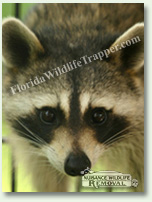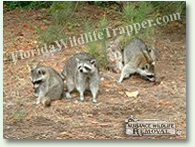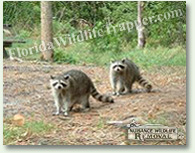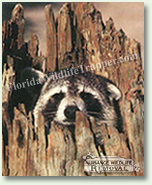
|
Raccoons The raccoon, or simply "coon", is one animal that most people are well-acquainted with. They are found commonly in every one of the lower 48 States, in much of southern Canada and throughout Mexico and Central America. Raccoons are very adaptable animals and thrive in all kinds of habitats from the desert southwest to tropical forests and northern hardwoods. Unlike many wildlife, raccoons also do especially well in urban areas. Raccoons are found statewide in Florida in ever-increasing numbers. Urbanization and agriculture often help their population because food often becomes more available in these conditions. Therefore, it is not at all uncommon to encounter raccoons near your home or neighborhood. There is no mistaking a raccoon for any other animal. Its stout, bear-like body, prominent black mask and heavily furred, ringed tail all are distinctive. The raccoon, or simply "coon", is one animal that most people are well-acquainted with. They are found commonly in every one of the lower 48 States, in much of southern Canada and throughout Mexico and Central America. Raccoons are very adaptable animals and thrive in all kinds of habitats from the desert southwest to tropical forests and northern hardwoods. Unlike many wildlife, raccoons also do especially well in urban areas. Raccoons are found statewide in Florida in ever-increasing numbers. Urbanization and agriculture often help their population because food often becomes more available in these conditions. Therefore, it is not at all uncommon to encounter raccoons near your home or neighborhood. There is no mistaking a raccoon for any other animal. Its stout, bear-like body, prominent black mask and heavily furred, ringed tail all are distinctive.
Breeding occurs first when they are one year old. Normally, one litter is born each year. In Florida, this generally occurs in March and April. Litters average about 3 to 4 young, though as many as 7 have been recorded. Newborn raccoons' eyes remain closed until about 20 days old, they are weaned at 10 to 12 weeks, and the offspring may stay with their mother until they are 10 months old. Raccoons have few enemies other than man. A few are killed by predators such as bobcats and horned owls, but the overall numbers are insignificant. Automobiles likely kill more.
Raccoons also are not fussy about their living quarters. Under normal conditions, they usually select a den in a hollow tree, usually a large limb instead of the trunk. Dens in trees may be anywhere from ground level to 60 feet above ground.
The greatest problem with raccoons is disease. Raccoons are known to carry a wide variety of diseases. Most of these are harmless to them and to people, but a few, such as distemper, can kill raccoons when their populations get too dense. These diseases also can infect pets that are not vaccinated. Rabies is another such disease. The risk of rabies is small (less than 1 out of 200 raccoons in the wild have been exposed to rabies), but the risk should never be taken lightly. Raccoons are wild animals and should never be treated as pets. | ||||||||||||||||||||||||||||
 Service Area Overview - Click here for more areas
Service Area Overview - Click here for more areas
Manatee, Sarasota, Charlotte,Orange, Hillsborough, Citrus, Hernando, Pasco, Pinellas, Polk, Lee, Palm Beach, Orlando, St. Lucie, Martin, Bradenton, Clearwater, Lakeland, Largo, Port Charlotte, St. Petersburg, Sarasota, Tampa, Tarpon Springs, Venice, West Palm Beach | |||
 Copyright 2011-2017 © Nuisance Wildlife Relocation, Inc. All Rights Reserved. FloridaWildlifeTrapper.com |
|||

 Adult raccoons are about 2 to 3 feet long (including their 10-inch tail) and weigh anywhere from 10 to 30 pounds. Larger animals sometimes are recorded, but Florida raccoons tend to be smaller than those farther north. Their color generally is a grizzled salt-and-pepper gray and black with a light belly. Often the "white" hairs are noticeably yellowish. Both all-black and all-white animals sometimes occur. Raccoons are active mostly during the evening hours. On most days, they leave their den soon after dusk and are active until morning. It is not unusual, however, for them to linger in their den well past nightfall, and during particularly nasty weather they may not venture out at all.
Adult raccoons are about 2 to 3 feet long (including their 10-inch tail) and weigh anywhere from 10 to 30 pounds. Larger animals sometimes are recorded, but Florida raccoons tend to be smaller than those farther north. Their color generally is a grizzled salt-and-pepper gray and black with a light belly. Often the "white" hairs are noticeably yellowish. Both all-black and all-white animals sometimes occur. Raccoons are active mostly during the evening hours. On most days, they leave their den soon after dusk and are active until morning. It is not unusual, however, for them to linger in their den well past nightfall, and during particularly nasty weather they may not venture out at all.
 Individual raccoons normally use a home range of 1 to 3 square miles and are somewhat territorial, especially the males. Raccoons seen in small groups most likely are females with young or unassociated adults from neighboring territories brought together by a large food source. Where food is plentiful, raccoons may travel more than a mile from their home range to feed. They also will tolerate severe reductions in territory size. Raccoon densities of 100 per square mile can be attained around abundant food sources. Raccoons are not fussy about their choice of food. Although classified as a carnivore, the raccoon eats as much or more plant as animal matter during the year. When fruits, acorns, vegetables and seeds are ripe and available, they will feed heavily on them. At other times and places they will specialize in eggs, insects, crayfish, frogs, fish and small mammals. They'll eat dead animals that they encounter; they'll raid bird feeders and pet food bowls when they're kept full; and they'll check out garbage cans that aren't secured.
Individual raccoons normally use a home range of 1 to 3 square miles and are somewhat territorial, especially the males. Raccoons seen in small groups most likely are females with young or unassociated adults from neighboring territories brought together by a large food source. Where food is plentiful, raccoons may travel more than a mile from their home range to feed. They also will tolerate severe reductions in territory size. Raccoon densities of 100 per square mile can be attained around abundant food sources. Raccoons are not fussy about their choice of food. Although classified as a carnivore, the raccoon eats as much or more plant as animal matter during the year. When fruits, acorns, vegetables and seeds are ripe and available, they will feed heavily on them. At other times and places they will specialize in eggs, insects, crayfish, frogs, fish and small mammals. They'll eat dead animals that they encounter; they'll raid bird feeders and pet food bowls when they're kept full; and they'll check out garbage cans that aren't secured.
 In urban and other areas where tree dens are lacking, raccoons choose a wide variety of "cavities" including rock and debris piles, attics, crawl spaces beneath mobile homes, culverts and sewer drains.
In urban and other areas where tree dens are lacking, raccoons choose a wide variety of "cavities" including rock and debris piles, attics, crawl spaces beneath mobile homes, culverts and sewer drains.